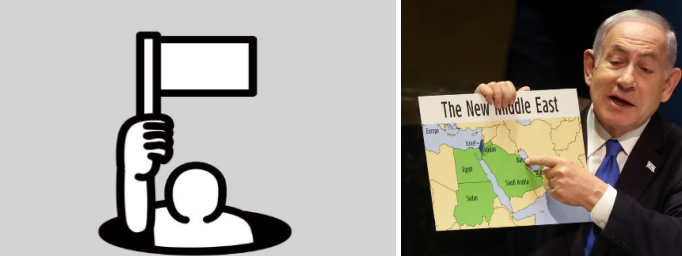 [1]
[1]
By John Helmer, Moscow
@bears_with [2]
The first Moscow newspaper analysis [3] has appeared of Russia’s current position towards Israel and Palestine. It supports President Vladimir Putin’s public endorsement of the two-state solution between the Israelis and Palestinians.
Entitled “Why Russia remains neutral in the conflict in the Middle East”, Vzglyad, the Moscow security strategy publication, posted the piece late on Friday evening, October 13 [4]. It added an opinion poll for its readers with a single question, “should Russia recognise Hamas as a terrorist organisation?”
The new analysis and conclusion are in contrast to Vzglyad’s call six months ago for Russia to reorient its position towards the Arab side [5]. This is also a marked change of editorial line in the prevailing silence in Moscow: there has been no Security Council meeting since October 3 [6]; no State Duma debate; no national opinion polling of public attitudes [7].
The Arab-Israeli conflict is the one in which Israel is destroying the remnants of the Palestine state territories of Gaza, the West Bank, and East Jerusalem, and replaces that two-state solution with a single state; that is the Israeli one in which about 7 million Jews restrict about 2 million Arabs in bantustans administered according to an apartheid regime [8].
The rules of this Jewish-based order have been fixed in Israel’s constitutional amendment enacted in 2018 [9]as the “Basic Law: Israel – the Nation State of the Jewish People”, and ratified by the Israeli Supreme Court in 2021 [10]. This adopts the single- state solution expanding territorially by resettlement of the Palestinian territories “as a national value”; and in parallel, combating international opposition to the process by Israeli state operations to “preserve the cultural, historical and religious heritage of the Jewish People among Jews in the Diaspora.”
By equating Jewish ethnicity and religious faith with nationality of the Israeli state, this constitution eliminates Palestinian, Arab, and Muslim rights with the formula, “the exercise of the right to national self-determination in the State of Israel is unique to the Jewish People.” The corollary is that any Palestinian exercise of the right to self-determination on the expanding Jewish national territory is illegal, anti-Semitic, and terrorist. Internationally, it is the policy of Israel and its allies to make support for or discussion of Palestinian right to self-determination a thought and speech crime.
In Russian politics, this is the one international conflict on which President Vladimir Putin has said so much since the start of his term, and done so little – this has been to advocate the two-state solution in public while in private to impose a do-nothing, say-catchword line on diplomats and military officials, and the state media.
The gap between the Kremlin and the General Staff and Defense Ministry became visible in September 2018 after the Israel Air Force caused the shoot-down in Syria of a Russian Ilyushin-20M electronic reconnaissance aircraft, and the killing of all fifteen crewmen on board [11]. At that time the Russian military expressed a loss of confidence which had not been seen in public since President Boris Yeltsin countermanded orders for Russian military support of Serbia under NATO bombing between March and June 1999, and dismissed Prime Minister Yevgeny Primakov on the US demand.
In the present fighting between Palestinian, Arab and Israeli forces, the options for Russian action are numerous [12]; the public debate over what the options should be has been nugatory. There have been no national opinion polls [7]; no State Duma debate [13]; no meeting of the Security Council since October 3 [6].
An initial statement by Patriarch Kirill of the Russian Orthodox Church was carefully balanced between Palestine and Israel, referring to the “military conflict” between the two sides, not a unilateral act of terrorism. “Peaceful coexistence” between the religious communities, Kirill said [14], has a “religious dimension” and requires a “just peace”. In context, this was a tilt against Israel. The Church’s Department for External Church Relations issued the statement on October 7; there has been nothing since.
As a bellwether of Russian security analysts, Vzglyad’s decision to publish a report of expert assessments on “the advantages of Russia’s neutrality in the conflict in the Middle East” is unusual. Vzglyad’s publishing record shows what the new report is not. Strategically, Russia is being obliged by the US and NATO alliance to fight an all-forces war in Europe, and commit small forces in separate conflicts in Syria; Transdnistria and Moldova; Azerbaijan and Armenia; with the possibility of engagement in the Kosovo fight against Serbia. There is no discussion in the Vzglyad outline of Russian capacities to conduct military operations on all battlefields simultaneously.
No military or intelligence source, to which Vzglyad has frequent and unique access, has been quoted [15]. Privately, some of these sources suspect bargaining with the US in the Quartet format of the American “monopoly” of Israel for Russia’s “monopoly” of the Ukraine.
Vzglyad’s writers and editors decline to answer questions.
The Russian text has been translated verbatim without cuts or editing. Illustrations and captions have been added for clarification.
October 13, 2023
WHY RUSSIA REMAINS NEUTRAL IN THE CONFLICT IN THE MIDDLE EAST
Experts have assessed the advantages of Russia’s neutrality in the conflict in the Middle East
By Yevgeny Poznyakov and Ilya Abramov
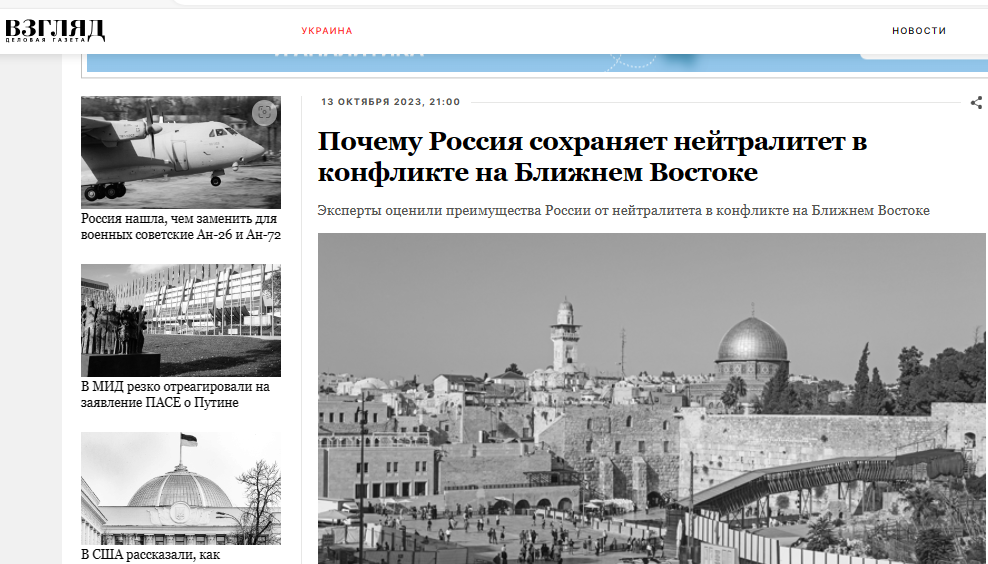 [17]
[17]Source: https://vz.ru/politics/2023/10/13/1234833.html [4]
Vladimir Putin has declared the need to create an independent state of Palestine – this will become the basis for the settlement of the conflict in the Middle East. On the other hand, the Russian president has recognised Israel’s right to self-defence. Thus, Moscow has once again indicated its neutrality in this matter. Why has equidistance become Russia’s main position in the current events and what benefits does this approach promise Moscow?
This week, President Vladimir Putin said that Russia assumes that there is no alternative to resolving the Palestinian-Israeli conflict through negotiations. He announced this at the CIS [Commonwealth of Independent States [18]] summit in Bishkek. According to him, Tel Aviv was subjected to a brutal attack and has the right to defend itself, but a real settlement of the situation is possible only if an independent Palestine is created with East Jerusalem as its capital.
In his opinion, the goal of the negotiations should be the implementation of the UN formula of ‘two states’, and there is no alternative to this. He added that ‘we need to take care of resolving this issue by peaceful means.’ Putin called the war in the Middle East a large-scale tragedy for the Israelis and Palestinians. This conflict was ‘a direct result of the failed policy of the United States in the Middle East.’ In addition, the Russian leader warned Tel Aviv against launching a ground operation in the Gaza Strip.
The entire international community is concerned about the solution of the Palestinian-Israeli conflict. Back in 1967, after the end of the Six-Day War, the UN Security Council issued Resolution 242 calling on Tel Aviv to withdraw troops from the territory of East Jerusalem annexed during the fighting.
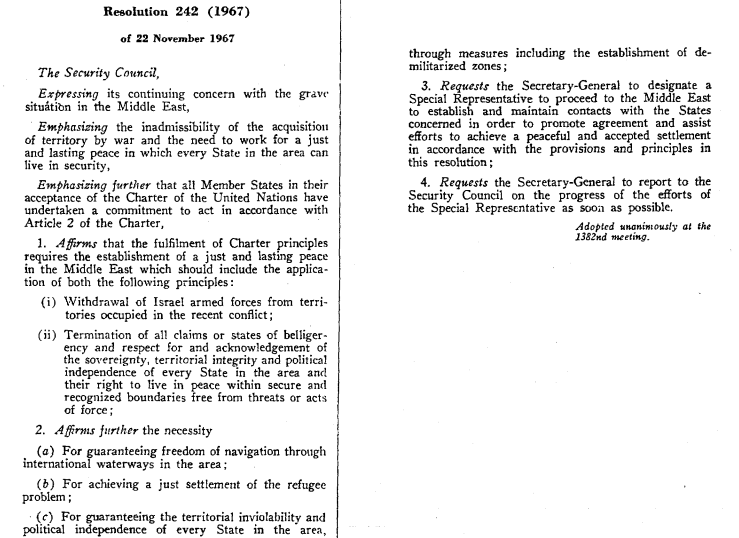 [19]
[19]Click on source to enlarge and read: https://peacemaker.un.org/ [20]
In July 1980, the Conference of Leaders of Non-Aligned Countries declared the holy city ‘an integral part of occupied Palestine’ and it ‘must be completely abandoned and unconditionally transferred to Arab sovereignty.’ In response, Tel Aviv adopted a law on Jerusalem, according to which the settlement was proclaimed ‘one and indivisible’ and was given the status of the capital of the Jewish state.
Following that, United States tried to resolve the situation in the region. In 1993, as part of secret negotiations in Norway, the Oslo-1 agreement was signed, according to which the Palestine Liberation Organization (PLO) recognised Israel’s rights to exist ‘in peace and security’, and Tel Aviv agreed to interim agreements on self-government for the Arab autonomy.
Later, in 1995 the Oslo-2 agreement was signed on expanding the power of the Palestinians by creating an elected body for a limited period – for a period of no more than five years from the date of signing the agreements. However, the authority of the document was undermined by the change of government in Israel in 1996, as a result of which the country postponed the redeployment of troops in Hebron.
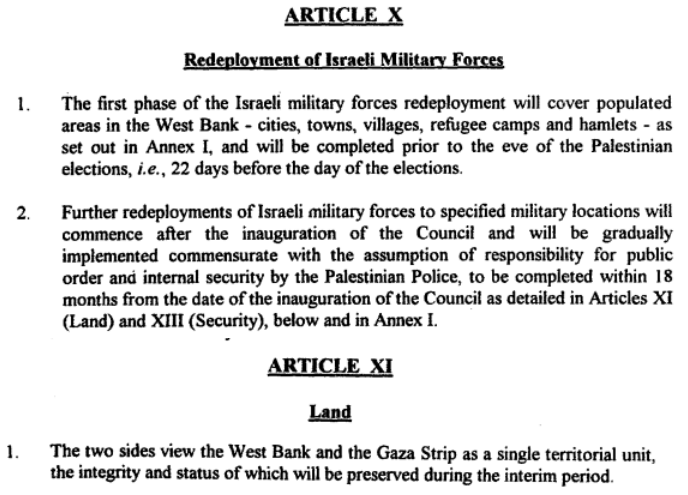 [21]
[21]Click on source to enlarge and read: https://peacemaker.un.org/ [22]
Against the background of the unceasing attempts of the world community to reconcile the conflicting parties, Russia has built strong relations with both Palestine and Israel. Tel Aviv and other cities have become the centre of attraction for immigrants from the USSR and Russia. The poet and bard Vladimir Vysotsky aptly spoke about the strong social ties of the two peoples at the time: ‘… and there is a quarter of our former people.’
A similar state of affairs affects the current interaction of the states. The Israeli authorities avoided, as far as possible, involvement in the conflict in Ukraine, and the personal relations of Israeli Prime Minister Benjamin Netanyahu and Vladimir Putin have always been considered warm, as the newspaper Vzglyad previously reported in detail [23].
At the same time, Russia is a long-standing and reliable partner of many Muslim and Arab states. During the Soviet period, Moscow was the defender of the Palestinians, and therefore the friendship of the parties was not lost even after the collapse of the USSR. At the same time, the building of relations with Iran is successfully progressing, which also has its own view on the current conflict.
In addition, the efforts of domestic diplomacy have created a path and difficult but constructive and mutually beneficial relations with Turkey, another important player in the region. And there are many Muslims living in Russia itself, which plays into Moscow’s hands when building partnership and trusting relations with states where Islam is the main religion.
In this regard, the expert community is confident that the position taken by Russia is the only correct one under the circumstances. Moscow is aware of the importance of creating two independent states in the region and insists on a peaceful settlement of the conflict, not wanting to see its expansion into the entire Middle East.
‘Moscow continues to defend the classic thesis for international relations that an armed conflict is an unacceptable way to resolve existing contradictions. This explains our neutrality within the framework of the ongoing events,’ said Stanislav Tkachenko, Professor of the Department of European Studies at the Faculty of International Relations of St. Petersburg State University, an expert of the Valdai Club.
‘The position taken by Russia is optimal. We are clearly aware that this war does not affect Moscow’s key interests, respectively, and it is not worth wasting invaluable diplomatic and military resources on it. However, Western countries adhere to a completely different approach in their policies,’ the source believes.
‘The US and the EU have almost completely aligned themselves with Tel Aviv, which reduces their manoeuverability. Moreover, the need to provide enormous support to Israel distracts the attention of Washington and Brussels from what is happening in Ukraine. This, of course, plays into Russia’s hands,’ the expert notes.
‘Nevertheless, Moscow does not want to see an increase in the conflict zone to the scale of the entire Middle East region. This scenario will not be beneficial to any state. However, theoretically, if Western countries begin to increase the volume of aid to Israel, then such an outcome will become quite likely,’ the source emphasises. ‘In this case, Russia can use its strong ties with both Palestine and Israel to act as a mediator in resolving the conflict,’ Tkachenko notes. ‘However, at the moment we are not actively seeking to fulfil this role, the time has not yet come.’
Timofei Bordachev, program director of the Valdai International Discussion Club, also calls the position chosen by Moscow correct. ‘In the current conflict, Russia stands on the side of international law. The need to create two full-fledged states, Israel and Palestine, has long been spelled out in many international documents. Nevertheless, we see that there is practically no progress in this direction,’ he said.
‘However, the implementation of the announced provisions is necessary. This method is the only way out of the crisis that can help stabilise the situation in the region. Actually, Vladimir Putin correctly points out the same thing. At the same time, the sympathies of Western countries are obviously leaning in favour of Israel,’ the expert notes.
‘Such a policy is not acceptable for Russia. We have taken a clear and verified position of neutrality. In my opinion, in the current situation this approach is most in line with Moscow’s interests. Our country does not have the habit of poking its nose into other people’s affairs, so we will continue to keep our distance from what is happening,’ Bordachev emphasizes.
At the same time, the current conflict is fraught with many potential benefits for Russia, it is believed in Europe. According to German political scientist Alexander Rahr, Russia is quite capable of providing direct assistance to resolve the confrontation between Hamas and Israel. ‘In a situation where the entire Western world has unconditionally sided with Tel Aviv, Moscow could theoretically act as a great mediator in the conflict. Washington and Brussels risk losing the trust of the Muslim states if the fighting in the Gaza Strip becomes protracted’, the source admits. ‘In addition, Russia benefits from the current events in terms of diverting the attention of the United States and the EU from Ukraine towards the Middle East. The current situation in the geopolitical arena gives Moscow a large number of opportunities. However, in order to implement them, it is necessary to offer constructive approaches to getting out of the situation and implement diplomatic efforts at a qualitative level,’ the political scientist emphasizes.
‘Over time Russia could use its influence in the Middle East to prevent the threat of an Iranian-Israeli war. It is quite possible that Tel Aviv will try to take revenge on Teheran for supporting Hamas,’ Rahr believes.
However, not everyone is ready to accept Moscow’s neutrality in its current form. Thus, Yakov Kedmi, the former head of the Israeli intelligence service Nativ, does not consider Russia’s position ‘correct and beneficial to it.’ ‘I understand that the Kremlin wants to maintain warm relations with Turkey and Iran. In addition, many Muslims live on the territory of the Russian Federation. Therefore, Moscow is trying not to choose a side,’ he notes.
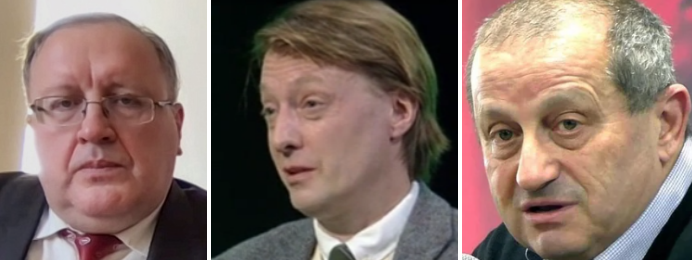 [24]
[24]Left to right: Stanislav Tkachenko, Timofei Bordachev, Yakov Kedmi (Yakov Kazakov). The Valdai Club in which the first two Russians participate regularly, is an academic organisation financed by the Kremlin. Russian-born Kedmi is an Israeli who used to run Nativ, an Israel government organisation for the objectives of encouraging Jews to migrate from Russia and gathering intelligence on Russia from those who do not.
‘”However, it would be fair to recognize Hamas as terrorists. The fact is that they are not the legitimate authority of the Gaza Strip. The group has taken control of it by force and is now killing civilians on our territory. Moreover, Israel even cooperates with the Palestinian authorities to prevent the crimes of the Islamic organization,’ the source emphasizes.
‘I believe that Russia can support the legitimate authority of Palestine and contribute to the return of the Gaza Strip under its control. However, it is also necessary to recognise Hamas as a terrorist organization. Moscow will act based on its interests, but at the same time it will condemn radicals and extremists,’ Kedmi emphasises.
Kirill Semenov, an expert of the Russian Council on International Affairs, expresses a different position. In his opinion, Moscow ‘made it clear that it considers the creation of an independent state of Palestine incredibly important, but Tel Aviv does not want the future of the region to be built in this direction.’
‘Israel has been deliberately oppressing the Gaza Strip and the West Bank for a long time. Local residents were forced out of their native lands by illegal development of the territory. This cannot work to achieve stability in the Middle East, so Russia quite correctly points out the need to change the current situation,’ the source says. .
‘Nevertheless, Moscow is still interested in developing at least neutral relations with Israel. The current geopolitical situation allows both countries to stop concerns about each other. Russia’s neutrality serves as a kind of assurance to Tel Aviv that weapons will not be sent en masse to Iran,’ the expert emphasises.
‘I note that any equipment delivered to Teheran may end up in the hands of Hamas or Hezbollah. Of course, Israel is trying to avoid this outcome. In this regard, the country is also restrained from supporting Ukraine, since this would be the starting point for a tougher position of Russia,’ Semenov sums up.
Meanwhile, the Kremlin previously answered the question of why Moscow does not recognize Hamas as a terrorist organization. As the press secretary of the President of the Russian Federation Dmitry Peskov recalled, Russia maintains contacts with both sides of the conflict, and the ‘number one priority’ in this matter is the interests of the country’s citizens who live both in Palestine and in Israel. ‘In addition, Russia continues to carefully analyse the situation and maintains its position as a party that has the potential to participate in the settlement processes,’ Peskov was quoted as saying [25].
At the same time Putin later noted once again that ‘Israel was faced, of course, with such an unprecedented attack, which has not been in history – not only in scale, but also in the nature of execution – what can I say, we need to call things by their proper names.’ At the same time, ‘Israel responds on a large scale and also with rather cruel methods.’
First of all, the President stressed, it is necessary to think about the civilian population in the situation around the Palestinian-Israeli conflict. ‘Of course, we understand the logic of events. But despite all the toughening on both sides, I still think that, of course, we need to think about the civilian population,’ Putin concluded.
Question: Should Russia recognize Hamas as a terrorist organization?
 [27]
[27]Results: Yes, 29.2%; No, 59.4%; difficult to say, 17.5%. Sample 1,804.
NOTE: The lead image, right, is Prime Minister Netanyahu’s display of a map at his UN speech on September 22, 2023. Here is the Jerusalem Post report of Netanyahu’s speech explaining his map [28]. The territory of Israel in Netanyahu’s display incorporated all the Palestinian territories and the Syrian Golan Heights. Here is the Palestinian interpretation of the map in retrospect, broadcast on October 14 [29] -- from Min 10:57:
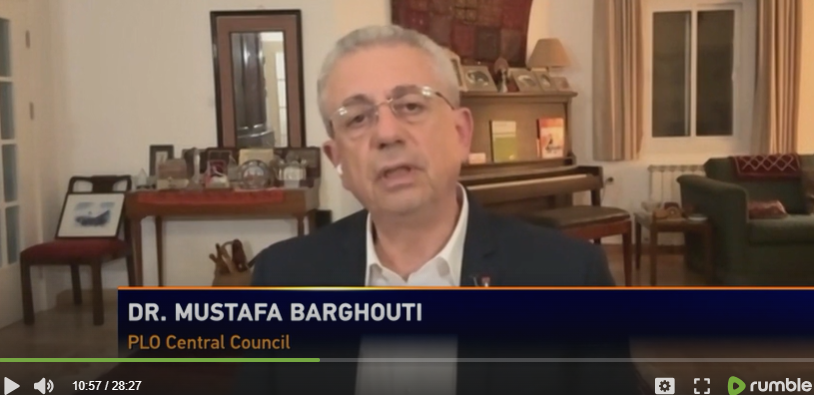 [30]
[30]
